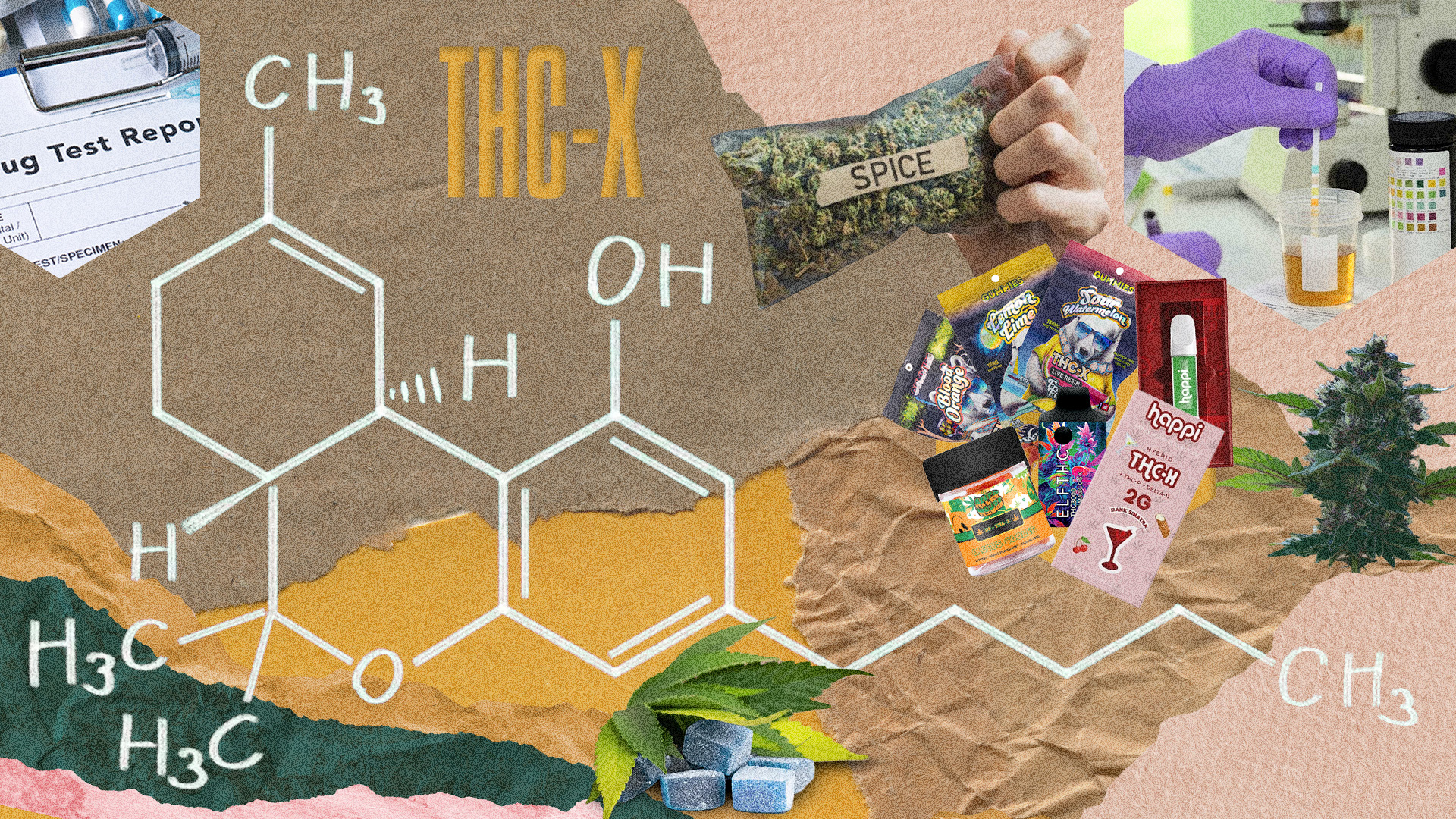Move over natural cannabidiol (CBD) and delta-9–tetrahydrocannabinol (THC). THC-X, a novel synthetic cannabinoid, has captured the attention of both the medical community and recreational cannabis users alike.
At first glance, THC-X has a striking resemblance to high-quality THC, the primary psychoactive compound found in medical cannabis plants.
However, a closer look reveals that THC-X, though engineered to mimic high-THC cannabis, actually has its own unique chemical structure. This puts it in a new class by itself for those seeking its psychoactive effects for recreational use.
Join us as we explore the chemistry and evolving landscape of THC-X.
What is THC-X Cannabis?
THC-X, often referred to as delta-X, is a substance developed from a unique combination of three proprietary delta-8 THC esters. Crafted in a laboratory setting, THC-X is structured to mimic the molecular structure of THC, but it has one significant difference–the presence of a fluorine atom.
This seemingly minor distinction in its chemical makeup is crucial and fundamentally changes how THC-X interacts with the body’s endocannabinoid receptors compared to its natural counterpart, THC.
It is estimated that THC-X contains 50% of the amount of THC found in regular varieties, although more research is needed to confirm this.
Likely available in your local medical marijuana dispensary and online stores, THC-X products are commonly found in different vaping setups. These products, typically marketed alongside alternatives to delta-9 THC, also include edibles. Should the interest in this cannabinoid and other THC derivatives continue to rise, we might soon witness more product variety, potentially including topicals and tinctures.
However, there’s some uncertainty surrounding THC-X among consumers. This largely stems from its lack of recognition as a clinically established cannabinoid. Additionally, a few companies selling delta-X products mostly limit the minimal information available to promotional material.
Additionally, the authenticity of THC-X as a distinct cannabinoid remains under scrutiny. Given its striking similarities in effects and naming to delta-10 THC, some speculate that delta-X could simply be a rebranded version of an existing substance or a new marketing angle for a previously known product.
Why You Should Get Your Medical Marijuana Card
Veriheal has satisfied millions of patients nationwide by giving them access to these benefits
- Larger purchase limits
- Peace of mind
- Enhanced legal protection
- Access to higher potency strains
- Save up to 25% on cannabis purchases
- Skip the line at the dispensary
The limited online information further fuels doubts, leading some to question if it’s more of a marketing strategy than a novel cannabinoid.
Retailers promoting THC-X describe it as a psychoactive cannabinoid, similar to delta-8, which is known for its stress-relieving effects without inducing an intense high. Despite this, the broader consensus does not widely regard it as a medicinal product.
Navigating the Side Effects of THC-X
For now, there’s limited information available about THC-X. Anecdotal evidence often likens its effects to those of delta-10, rather than delta-8. This similarity has led to speculation that THC-X might essentially be delta-10 under a different name. However, without knowing for sure, observers note that both delta-X and delta-10 exhibit similar effects.
Effects of delta-X may include:
- A sense of calmness and relaxation
- Feelings of happiness and euphoria
- A boost in energy levels
However, it’s important to note potential negative side effects, which could include:
- Feelings of anxiety or psychosis (particularly in those with previously diagnosed mental health issues)
- Dry mouth, commonly referred to as cottonmouth
- Dryness or redness in the eyes
- An increase in appetite
- A quicker heart rate
- Short-term memory challenges
- Mild impairment in cognitive functions
- Slower response times
It’s crucial to use caution when trying new substances, especially those not derived directly from natural cannabis sources, such as THC-X, delta-11 THC, or delta-8 THC. Cannabis experiences vary widely among individuals. Delta-X is usually thought to produce a less intense high. However, this might not be the case for everyone, particularly for those with low tolerance or those new to cannabis.
If you decide to give it a try, start with microdosing to see how you adjust to the new cannabinoid.
Will THC-X Show Up in A Drug Test?
Despite being a synthetic compound, THC-X may still be detectable in standard drug tests designed for cannabinoids, primarily due to its chemical similarity to THC. This overlap raises concerns about the accuracy and specificity of current drug testing methods, which may not be able to tell the difference between various cannabinoids. As a result, people using THC-X could face false positives.
In a Nutshell
THC-X represents a fascinating frontier in the world of using synthetic cannabinoids for healthcare. While its similarities to other forms of THC open up avenues for therapeutic use, its distinct chemical structure calls for further research and understanding. Considering its possibilities, the balance of safety, legality, and efficacy remains key.
As a result, the journey of THC-X from a laboratory innovation to a possibly widely accepted medicinal cannabinoid is a testament to the ever-evolving landscape of cannabis research and regulation.
Note: The content on this page is for informational purposes only and is not intended to be professional medical advice. Do not attempt to self-diagnose or prescribe treatment based on the information provided. Always consult a physician before making any decision on the treatment of a medical condition.
Author, Share & Comments
















